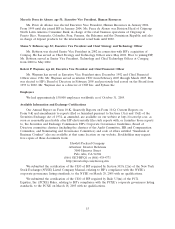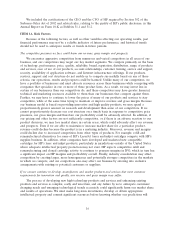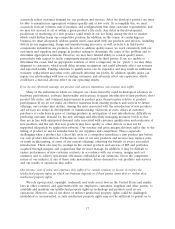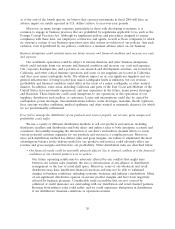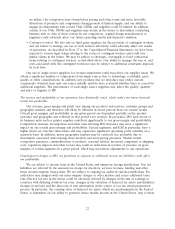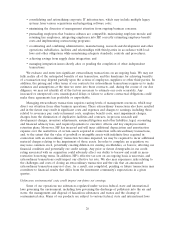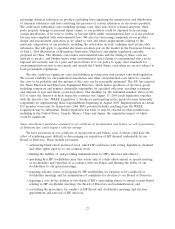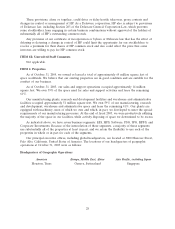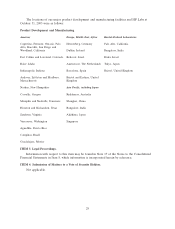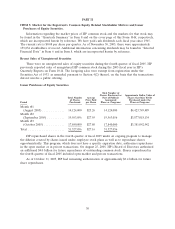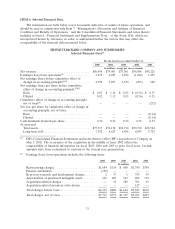HP 2005 Annual Report Download - page 28
Download and view the complete annual report
Please find page 28 of the 2005 HP annual report below. You can navigate through the pages in the report by either clicking on the pages listed below, or by using the keyword search tool below to find specific information within the annual report.executives, engineers, skilled solutions providers in the IT support business and qualified sales
representatives are critical to our future, and competition for experienced employees in the IT industry
can be intense. The failure to hire or loss of key employees, including employees who elected to
participate in the U.S. early retirement program announced in July 2005, could have a significant
impact on our operations.
Decreased effectiveness of share-based compensation could adversely affect our ability to attract and retain
employees.
We have historically used stock options and other forms of share-based compensation as key
components of our total rewards employee compensation program in order to align employees’
interests with the interests of our stockholders, encourage employee retention and provide competitive
compensation and benefit packages. In recent periods, some of HP’s employee stock options have had
exercise prices in excess of HP’s stock price, which reduces their value to employees and could affect
our ability to retain present, or attract prospective employees. In addition, in accordance with Financial
Accounting Standards Board Statement 123R, ‘‘Share-Based Payment,’’ HP will begin recording charges
to earnings for share-based payments in the first quarter of fiscal 2006. As a result, we will incur
increased compensation costs associated with our share-based compensation programs. Moreover,
difficulties relating to obtaining stockholder approval of equity compensation plans could make it
harder or more expensive for us to grant share-based payments to employees in the future. Like other
companies, HP has reviewed its equity compensation strategy in light of the current regulatory and
competitive environment and has decided to reduce the total number of options granted to employees
and the number of employees who receive share-based payments. Due to this change in our share-
based compensation strategy, we may find it difficult to attract, retain and motivate employees, and any
such difficulty could materially adversely affect our business.
HP’s stock price has historically fluctuated and may continue to fluctuate, which may make future prices of
HP’s stock difficult to predict.
HP’s stock price, like that of other technology companies, can be volatile. Some of the factors that
can affect our stock price are:
• speculation in the press or investment community about, or actual changes in, our executive
team, strategic position, business, organizational structure, operations, financial condition,
financial reporting and results, effectiveness of cost cutting efforts, prospects or extraordinary
transactions;
• the announcement of new products, services, technological innovations or acquisitions by HP or
competitors; and
• quarterly increases or decreases in revenue, gross margin or earnings, changes in estimates by
the investment community and variations between actual and estimated financial results.
General or industry-specific market conditions or stock market performance or domestic or
international macroeconomic and geopolitical factors unrelated to HP’s performance also may affect
the price of HP common stock. For these reasons, investors should not rely on recent trends to predict
future stock prices, financial condition, results of operations or cash flows. In addition, following
periods of volatility in a company’s securities, securities class action litigation against a company is
sometimes instituted. If instituted against HP, this type of litigation could result in substantial costs and
the diversion of management time and resources.
24



